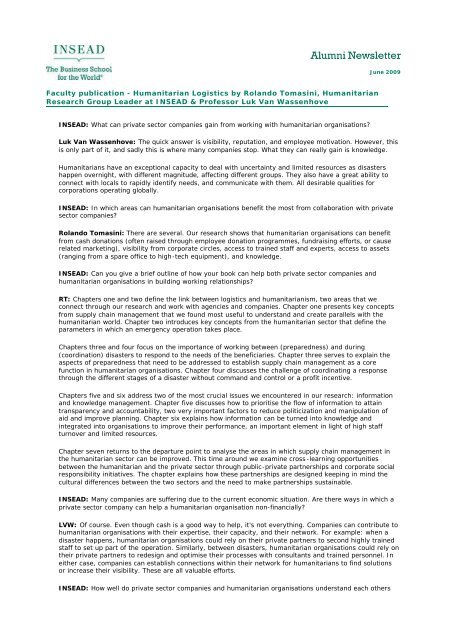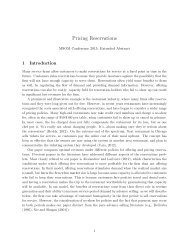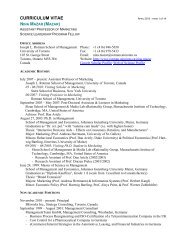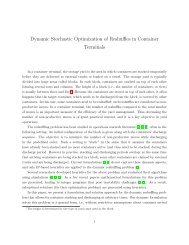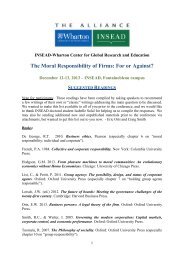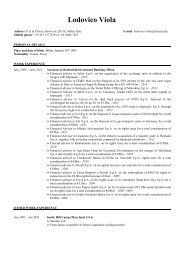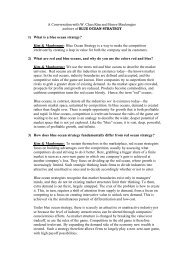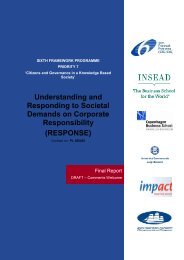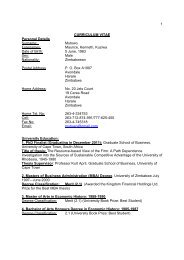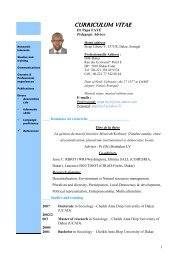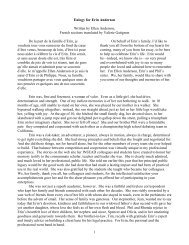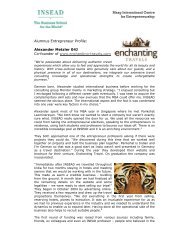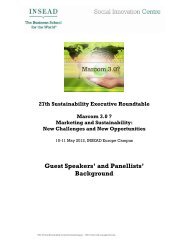Print this newsletter (pdf) - Insead
Print this newsletter (pdf) - Insead
Print this newsletter (pdf) - Insead
Create successful ePaper yourself
Turn your PDF publications into a flip-book with our unique Google optimized e-Paper software.
Faculty publication - Humanitarian Logistics by Rolando Tomasini, Humanitarian<br />
Research Group Leader at INSEAD & Professor Luk Van Wassenhove<br />
INSEAD: What can private sector companies gain from working with humanitarian organisations?<br />
June 2009<br />
Luk Van Wassenhove: The quick answer is visibility, reputation, and employee motivation. However, <strong>this</strong><br />
is only part of it, and sadly <strong>this</strong> is where many companies stop. What they can really gain is knowledge.<br />
Humanitarians have an exceptional capacity to deal with uncertainty and limited resources as disasters<br />
happen overnight, with different magnitude, affecting different groups. They also have a great ability to<br />
connect with locals to rapidly identify needs, and communicate with them. All desirable qualities for<br />
corporations operating globally.<br />
INSEAD: In which areas can humanitarian organisations benefit the most from collaboration with private<br />
sector companies?<br />
Rolando Tomasini: There are several. Our research shows that humanitarian organisations can benefit<br />
from cash donations (often raised through employee donation programmes, fundraising efforts, or cause<br />
related marketing), visibility from corporate circles, access to trained staff and experts, access to assets<br />
(ranging from a spare office to high-tech equipment), and knowledge.<br />
INSEAD: Can you give a brief outline of how your book can help both private sector companies and<br />
humanitarian organisations in building working relationships?<br />
RT: Chapters one and two define the link between logistics and humanitarianism, two areas that we<br />
connect through our research and work with agencies and companies. Chapter one presents key concepts<br />
from supply chain management that we found most useful to understand and create parallels with the<br />
humanitarian world. Chapter two introduces key concepts from the humanitarian sector that define the<br />
parameters in which an emergency operation takes place.<br />
Chapters three and four focus on the importance of working between (preparedness) and during<br />
(coordination) disasters to respond to the needs of the beneficiaries. Chapter three serves to explain the<br />
aspects of preparedness that need to be addressed to establish supply chain management as a core<br />
function in humanitarian organisations. Chapter four discusses the challenge of coordinating a response<br />
through the different stages of a disaster without command and control or a profit incentive.<br />
Chapters five and six address two of the most crucial issues we encountered in our research: information<br />
and knowledge management. Chapter five discusses how to prioritise the flow of information to attain<br />
transparency and accountability, two very important factors to reduce politicization and manipulation of<br />
aid and improve planning. Chapter six explains how information can be turned into knowledge and<br />
integrated into organisations to improve their performance, an important element in light of high staff<br />
turnover and limited resources.<br />
Chapter seven returns to the departure point to analyse the areas in which supply chain management in<br />
the humanitarian sector can be improved. This time around we examine cross -learning opportunities<br />
between the humanitarian and the private sector through public-private partnerships and corporate social<br />
responsibility initiatives. The chapter explains how these partnerships are designed keeping in mind the<br />
cultural differences between the two sectors and the need to make partnerships sustainable.<br />
INSEAD: Many companies are suffering due to the current economic situation. Are there ways in which a<br />
private sector company can help a humanitarian organisation non-financially?<br />
LVW: Of course. Even though cash is a good way to help, it's not everything. Companies can contribute to<br />
humanitarian organisations with their expertise, their capacity, and their network. For example: when a<br />
disaster happens, humanitarian organisations could rely on their private partners to second highly trained<br />
staff to set up part of the operation. Similarly, between disasters, humanitarian organisations could rely on<br />
their private partners to redesign and optimise their processes with consultants and trained personnel. In<br />
either case, companies can establish connections within their network for humanitarians to find solutions<br />
or increase their visibility. These are all valuable efforts.<br />
INSEAD: How well do private sector companies and humanitarian organisations understand each others


